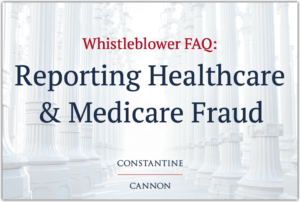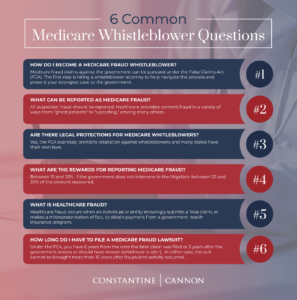Medicare Whistleblowers: The Most Common Questions Answered About Reporting Medicare Fraud

What potential whistleblowers need to know about reporting fraud in government healthcare programs.
Get answers to 6 common Medicare whistleblower questions
In this article, our experienced whistleblower attorneys have answered 6 of the most important and common questions posed by individuals who have knowledge of potential healthcare fraud, specifically, fraud in the Medicare program. Click the links below to jump to your question:
What is healthcare fraud?
In its simplest form, healthcare fraud occurs when an individual or entity, like a doctor, hospital, pharmacy, home health agency, or clinic, knowingly submits a false claim, or makes a misrepresentation of fact, to obtain payment from a government health insurance program.
Healthcare fraud also occurs when an individual or entity that is not itself a healthcare provider, but in some fashion participates in or profits from the healthcare system (like a pharmaceutical company, health insurer, pharmacy benefit manager, or medical device manufacturer), knowingly causes someone else—often an innocent patient or healthcare provider—to submit a false claim for payment from a government health insurance program.
A third type of healthcare fraud occurs when an individual or entity solicits, receives, offers, or pays remuneration—which can be anything of value—to induce or reward referrals for items or services reimbursed by government healthcare programs. Such payments are “kickbacks” and are illegal under the Anti-Kickback Statute.
Finally, healthcare fraud includes certain forms of self-interested referrals by physicians to clinical laboratories, outpatient clinics, or other entities in which the physician has a financial interest. Such referrals potentially violate the Stark Law.
The most common targets of healthcare fraud are state and federal government programs: Medicare, Medicaid, and Tricare. Medicare is the federal health insurance program that primarily covers the elderly. Medicaid is a joint state and federal program that insures those with low-income or disabilities. Tricare is the health insurance program for active and retired members of the U.S. military and their families.
All of the above types of healthcare fraud can be addressed with the help of whistleblowers under the federal False Claims Act and comparable state and local False Claims Acts. Some states, including California and Illinois, also permit whistleblowers to address healthcare fraud that targets private health insurance programs.
Healthcare fraud in any form wastes taxpayer money and causes harm to patients by leading to too little, too much, or simply inappropriate care. Even as the Department of Justice, with the help of whistleblowers, recovers billions of dollars in healthcare fraud every year, the federal government estimates that billions of dollars more remain undetected.
What can be reported as Medicare fraud?
In order to protect the integrity of the Medicare program, all suspected healthcare fraud can and should be reported to government authorities.
Healthcare providers and others who engage in fraudulent activity do so in a variety of ways. One of the most common methods is to submit a claim for healthcare services, including treatments or medical tests, that were never actually rendered.
Engaging in fraud through services not rendered can include the creation of “ghost patients,” which are either entirely made up and do not exist, or are real patients who never received the services listed in the reimbursement claim.
Along the same lines, a healthcare provider might also do what is called “upcoding.” Medical procedures are designated on claim forms by a number of specific billing codes. Upcoding occurs when that provider submits a claim with a billing code for a more serious (and therefore more expensive) procedure than was actually performed.
Billing for services that were not actually performed only scratches the surface of the kinds of methods used to defraud Medicare. Other kinds of fraud include paying kickbacks to induce the referral of patients, billing for treatments or procedures that aren’t medically necessary, and using false and misleading statements to market pharmaceutical drugs or medical devices for uses not approved by the FDA.
Visit our healthcare whistleblower page for more details on the kinds of activity that count as Medicare fraud.
How do I become a Medicare fraud whistleblower?
Medicare fraud claims can be pursued under the False Claims Act (FCA), which allows anyone with knowledge of fraud against the government to bring a lawsuit on the government’s behalf. As long as the alleged fraud targeted a government program, and has not already been publicly disclosed, the fraudulent activity is likely to be actionable under the FCA.
The first step in becoming a Medicare whistleblower is hiring an attorney experienced in filing whistleblower complaints. Lawsuits brought under the FCA follow a unique set of procedures, so it’s crucial to hire an attorney who can help you navigate the process and present your strongest case to the government. Indeed, the government will often dismiss whistleblower complaints brought under the FCA if the whistleblower is not represented by an attorney.
The lawyers at Constantine Cannon have extensive experience representing whistleblowers. Contact us today to speak confidentially about your case.
What are the rewards for reporting Medicare fraud?
Individuals who bring a case under the FCA are generally entitled to between 15 and 25% of whatever funds the government is able to recover. If the government does not intervene in the litigation, and the whistleblower proceeds and successfully resolves the case without government assistance, the whistleblower is entitled to a higher share: between 25 and 30% of the amount recovered.
This reward is due to a special part of the FCA known as the “qui tam” provision. For example, if the government intervenes and is able to recover $100 million, your whistleblower reward would normally be between $15 million and $25 million. If the government does not intervene, your maximum reward could be as high as $30 million.
The amount of the whistleblower’s reward depends on the total amount the government recovers, and on many other factors, including the quality of information provided by the whistleblower to the government, and the assistance provided by the whistleblower and whistleblower’s counsel. The more experienced your attorney, the better your odds are of coming out with a sizeable reward for the time and effort put into exposing the healthcare fraud.
In addition to a monetary reward, you are potentially also helping to expose criminal activity. Healthcare fraud whistleblowers are providing an important public service by bringing otherwise-undetected crimes to light.
Are there legal protections for Medicare whistleblowers?
Many whistleblower cases are brought by people close to the source of the fraudulent activity, like employees of pharmaceutical companies that pay kickbacks to physicians to prescribe the company’s drugs, and may be in danger of retaliation by their employer. To help prevent this, the FCA expressly prohibits retaliation against whistleblowers. Additionally, many states have their own laws that provide remedies for wrongful termination or discrimination.
Under Section 3730(h) of the FCA, an employee who is discharged, demoted, harassed, or otherwise discriminated against because of lawful activity concerning the FCA lawsuit is entitled to all the relief necessary to make that employee whole. This includes reinstatement, double back pay, and other special compensation, including the costs of litigation and attorney fees.
How long do I have to file a Medicare fraud lawsuit?
Under the FCA, there are two time-related factors that determine whether a Medicare fraud lawsuit may be filed: the law’s statute of limitations and the “first to file” rule.
Under the FCA, a lawsuit must be filed either six years from the date that the false claim was filed, or three years after the government knows or should have known about it, whichever is later. In either case, the lawsuit cannot be brought more than ten years after the fraudulent activity occurred.
The second consideration is the “first to file” rule. Generally, only the first person to file a lawsuit under the FCA regarding specific conduct is entitled to proceed. As a result, it’s important to file the lawsuit as quickly as possible. This is another reason why it’s highly important to hire an experienced qui tam attorney to assist in drafting and filing the complaint.
Considering blowing the whistle on Medicare fraud?
Reporting fraud in the healthcare industry is an important decision which requires resolve and courage. To make sure your interests are properly represented and that you will receive the compensation you deserve, it’s essential to consult with an experienced whistleblower attorney about your case. Contact Constantine Cannon today for a confidential consultation.
Learn more about being a whistleblower:
Tagged in: FCA Federal, Healthcare Fraud, Importance of Whistleblowers, Medicare, Whistleblower Answers,

next day on medical portal we get a blank page with just the 3 month A1c (meaning it came from somewhere else.) It reads “automatic process” Google says this really is NO THOUGHT PROCESS I say it’s FRAUD no doctors uses this EXCEPT diabetic doctors for FRAUD If you ask the doctors about the high reading of the “automatic process” the answer is:”you don’t need to know” Don’t you feel the “LOVE”?
Why do people who work for the State get to Fraudulent bill the Government?
I was billed by the Chronic Management department on 11/29/2019 for a telephone call consult that didn’t happen. I talked with Billing, the Case Manager and then last the Supervisor on today about the charge. The Supervisor told me they can and do bill patients once 2 telephone calls are made to them to discuss their chronic case once a month. She said they can legally do this. I said you can’t. She became upset and dismissed me from the program. She said I shouldn’t mind since I’m not paying the bill and the $5.00 portion that is a co-pay for me is forgiven since I’m low income. This is the exact same thing the Billing person told me.
I said that appointments should be set with patients through email or the telephone so that they know a call/appointment is scheduled. She said they have 3,000 patients on the plan therefore don’t have to do such.
Recently leased a wheelchair from local company. On the bill\contract I noticed a charge for 1 cushion back from the comfort company part #15-669-005. The charge for this item is,$335.00. Cant belive it cost that much! Error or ripoff I’m out $24.00. Not a lot by any means but as a disabled veteran EVERY$ counts!!!